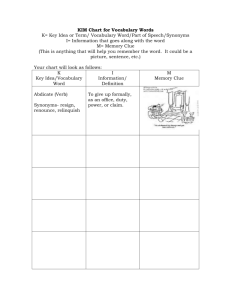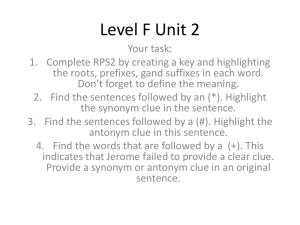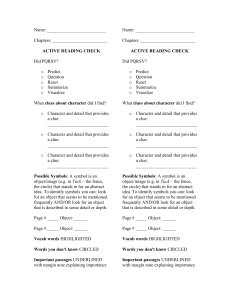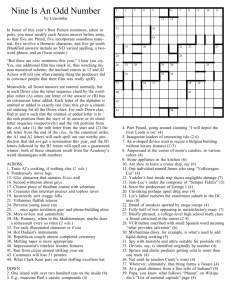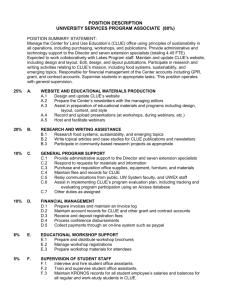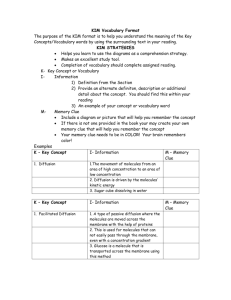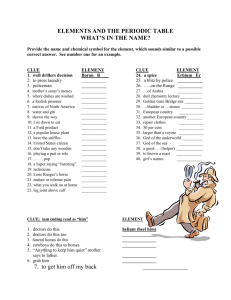Choosing the - Sadlier
advertisement
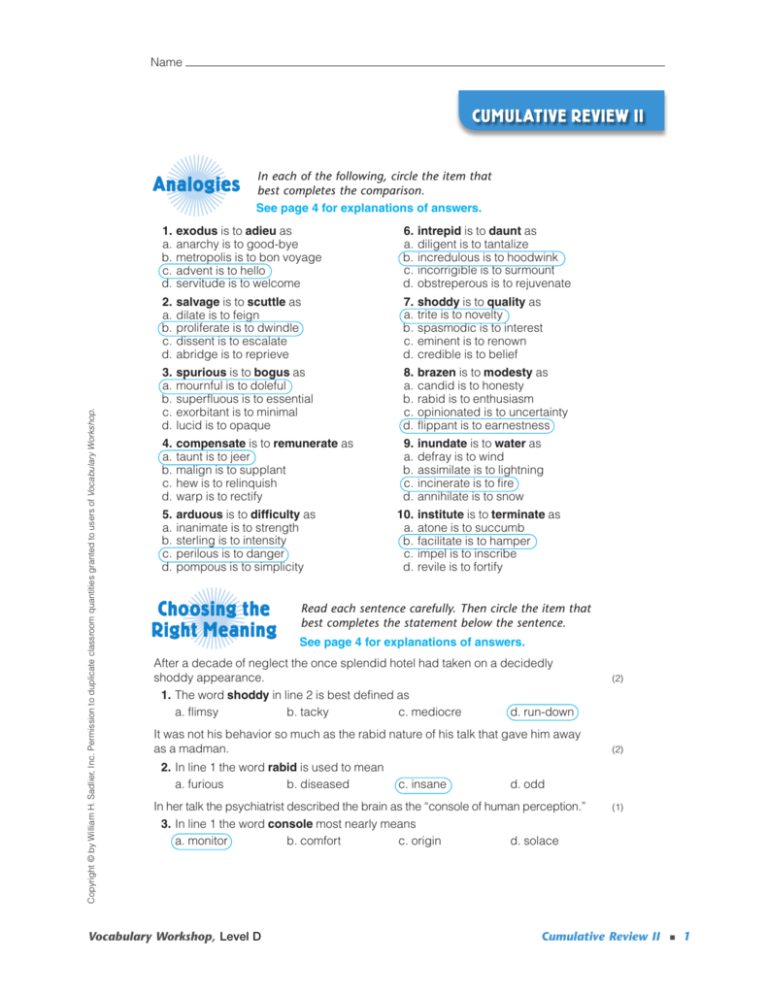
7109-5_VW_D_CumRevII_114-116 12/11/04 9:36 AM Page 114 Name Cumulative Review II C UMULATIVE R EVIEW II Copyright © by William H. Sadlier, Inc. Permission to duplicate classroom quantities granted to users of Vocabulary Workshop. Analogies In each of the following, circle the item that best completes the comparison. See for explanations of answers. See page pages4 T38–T48 for explanations of answers. 1. a. b. c. d. exodus is to adieu as anarchy is to good-bye metropolis is to bon voyage advent is to hello servitude is to welcome 6. a. b. c. d. intrepid is to daunt as diligent is to tantalize incredulous is to hoodwink incorrigible is to surmount obstreperous is to rejuvenate 2. a. b. c. d. salvage is to scuttle as dilate is to feign proliferate is to dwindle dissent is to escalate abridge is to reprieve 7. a. b. c. d. shoddy is to quality as trite is to novelty spasmodic is to interest eminent is to renown credible is to belief 3. a. b. c. d. spurious is to bogus as mournful is to doleful superfluous is to essential exorbitant is to minimal lucid is to opaque 8. a. b. c. d. brazen is to modesty as candid is to honesty rabid is to enthusiasm opinionated is to uncertainty flippant is to earnestness 4. a. b. c. d. compensate is to remunerate as taunt is to jeer malign is to supplant hew is to relinquish warp is to rectify 9. a. b. c. d. inundate is to water as defray is to wind assimilate is to lightning incinerate is to fire annihilate is to snow 5. a. b. c. d. arduous is to difficulty as inanimate is to strength sterling is to intensity perilous is to danger pompous is to simplicity Choosing the Right Meaning 10. a. b. c. d. institute is to terminate as atone is to succumb facilitate is to hamper impel is to inscribe revile is to fortify Read each sentence carefully. Then circle the item that best completes the statement below the sentence. See 4 T38–T48 for explanations of answers. See page pages for explanations of answers. After a decade of neglect the once splendid hotel had taken on a decidedly shoddy appearance. 1. The word shoddy in line 2 is best defined as a. flimsy b. tacky c. mediocre d. run-down It was not his behavior so much as the rabid nature of his talk that gave him away as a madman. 2. In line 1 the word rabid is used to mean a. furious b. diseased c. insane 114 (2) d. odd In her talk the psychiatrist described the brain as the “console of human perception.” 3. In line 1 the word console most nearly means a. monitor b. comfort c. origin (2) (1) d. solace Cumulative Review II Vocabulary Workshop, Level D Cumulative Review II ■ 1 7109-5_VW_D_CumRevII_114-116 12/11/04 9:36 AM Page 115 Name CUMULATIVE REVIEW II Cumulative Review Consumer advocates demanded that the manufacturer either retract or substantiate the exorbitant claims advanced for the product. 4. In line 2 the word exorbitant most nearly means a. overpriced b. unproven c. excessive (2) d. modest Scholars and students alike now use computers to access vast stores of information housed in libraries all over the world. 5. The best definition for the word access in line 1 is a. approach b. gain entry to c. admit Copyright © by William H. Sadlier, Inc. Permission to duplicate classroom quantities granted to users of Vocabulary Workshop. Two-Word Completions II (2) d. communicate Circle the pair of words that best complete the meaning of each of the following sentences. See for explanations of answers. See page pages4 T38–T48 for explanations of answers. 1. Though he has no real whose lacks in talent. a. repugnance . . . tenacity b. flair . . . diligence 2. As order gave way to of refugees seeking swelled to a mighty torrent. a. liability . . . immunity b. bondage . . . access for teaching, he’s a very hard worker and persistence make up handsomely for what he c. fodder. . .gluttony d. predisposition . . . mediocrity in that strife-torn country, the stream from the turbulence of the times c. deadlock . . . assurance d. anarchy . . . asylum towards the end of the play, the deposed and 3. In a famous incarcerated king laments the fact that the vast over which he once ruled has shrunk to the dimensions of a narrow prison cell. a. tirade . . . precipice c. monologue . . . realm b. interim . . . rift d. catalyst . . . debris 4. Instead of giving me the gist of his complaint in a few pithy sentences, he launched into a long and bitterly abusive against all the people he claimed were “out to get him.” a. lucid . . . venture c. terse . . . tirade b. erratic . . . feint d. opaque . . . altercation and 5. After the beauty pageant was over, of reporters swarmed into the backstage area hoping to get a few words with the winner of the contest. a. dilemmas . . . surly c. muddles . . . prim b. hordes . . . comely d. deadlocks . . . sprightly Cumulative Review II ■ 2 Cumulative Review II 115 Vocabulary Workshop, Level D 7109-5_VW_D_CumRevII_114-116 12/11/04 9:36 AM Page 116 Name Cumulative Review II Enriching Your Vocabulary Read the passage below. Then complete the exercise at the bottom of the page. Copyright © by William H. Sadlier, Inc. Permission to duplicate classroom quantities granted to users of Vocabulary Workshop. HowDoes Does It How ItSound? Sound? Every day, thousands of diverse sounds bombard our ears. A modern, ever-changing language must have words that describe, evaluate, and distinguish the different sounds we hear. Many of the sound words that enrich our language imitate the very sounds they name. The use of words that imitate sounds is called onomatopoeia. Examples include hiss, buzz, splash, cluck, quack, snort, twitter, chirp, ping, boom, clang, clop, and mumble. Rasping (Unit 9), an adjective for a harsh, grating sound, is another example of onomatopoeia. As you might guess, onomatopoetic words are popular with children, comedians, entertainers, and poets. Some English words about sound come from science. Many originate in the world of music, with its myriad terms to express concepts of melody, rhythm, color, volume, and harmony. A voice that quavers (Unit 11) has a marked shake or trill to it. The staccato (Unit 11) sound of popping firecrackers comes from an Italian SPLASH! That’s the perfect word for the sound word that means “detached.” Sound words can of a swimmer jumping into the water. be purely descriptive; they can be used to make sonic judgments. Others offer emotional connotations, such as pleasure, surprise, anticipation, or grief. Pause for a moment to listen to the hum of spoken language to perceive its special resonance. In Column A below are 10 more words related to sound. With or without a dictionary, match each word with its meaning in Column B. Column A g d j e a h b i f c 116 1. 2. 3. 4. 5. 6. 7. 8. 9. 10. ■ Column B discordant dulcet keen shrill sibilant sonorous stentorian strident tremulous vociferate a. a hissing sound as made by s, sh, z, or zh b. extremely loud c. to utter or shout loudly and vehemently, especially in protest; bawl, clamor d. pleasant to hear, melodious, sweet-sounding e. high-pitched or piercing in sound or tone; irritatingly insistent f. marked by trembling, quivering, or shaking g. disagreeable in sound; dissonant, out of harmony h. having or producing a resonant sound that is full, deep, or rich i. loud, harsh-sounding, grating, shrill, raucous j. (v.) to wail loudly or lament shrilly for the dead Cumulative Review II Vocabulary Workshop, Level D Cumulative Review II ■ 3 7. (c) ventured (Inference clue: What is one doing when one is taking risks?) . . . remunerated (Inference clue: What does one expect from taking risks?) Choosing the Right Meaning (page 109) 1. (c) (Clue: Context indicates physical movement, as of a crab.) (a), (b), (d): ir. 2. (d) (Clue: How should a judge view a debate?) (a), (b), (c): ws. 3. (a) (Clue: Context indicates sensory property.) (c), (d): ws; (b): ir. Cumulative Review II 4. (b) (Clue: Context indicates a topographic feature.) (d): ws; (a), (c): ir. 5. (a) (Clue: What would “wave upon wave” of attackers probably do to a “few” defenders?) (b): ws; (c), (d): ir. Explanation of Answers CUMULATIVE REVIEW II Analogies (page 1) Copyright © by William H. Sadlier, Inc. Permission to duplicate classroom quantities granted to users of Vocabulary Workshop. 1. (c) At the A of someone, you would probably say B. 2. (b) A means the opposite of B. 3. (a) A means the same as B. 7119-2_FM_VW_Lev_D_TE_38-48 3/30/05 8:03 PM Page 42 4. (a) A means the same as B. 5. (c) Something that is A is by definition full of B. 6. (b) Someone who is A would not be easy to B. 7. (a) Something that is A lacks B. 8. (d) Someone who is A lacks B. 9. (c) You would A something with B. 10. (b) A means the opposite of B. Choosing the Right Meaning (pages 1–2) 1. (d) (Clue: How would a “decade of neglect” affect the appearance of even a “once T41 splendid” building?) (a), (b), (c): ws. 2. (c) (Clue: What kind of talk would suggest madness?) (a), (b): ws; (d): ir. 3. (a) (Clue: Sentence employs figurative comparison.) (b), (d): ir (derived from verb form); (c): ir. 4. (c) (Clue: What sort of claims would likely spur demands for proof?) (a): ws; (b), (d): ir. 5. (b) (Clue: How might computers be used with regard to information?) (a): ws; (c), (d): ir. Two-Word Completions (page 2) 1. (b) flair (Restatement clue: “talent”; Contrast clue: “though . . . lacks in talent”) . . . diligence (Restatement clue: “and persistence”) 2. (d) anarchy (Restatement clue: “turbulence”) . . . asylum (Inference clue: What are refugees usually seeking?) 3. (c) monologue (Inference clue: What is a speech for one actor in a play often called?) . . . realm (Inference clue: Over what does a monarch rule?) 4. (c) terse (Restatement clue: “and pithy”) . . . tirade (Inference clue: What would you call a speech that was long and bitterly abusive?) 5. (b) hordes (Inference clue: What would you call a group that swarmed all over the place?) . . . comely (Inference clue: What would you call the physical appearance of a beauty pageant winner?) REVIEW UNITS 10–12 Two-Word Completions (page 141) 1. (d) erroneous (Inference from “If . . . correct”) . . . impaired (Inference from “his . . . convincing”) 2. (b) forestall (Restatement clue: “anticipate”) . . . wily (Restatement clue: “cunning”) Cumulative Review II ■(Inference 4 Vocabulary Level D 3. (b) lithe clue: How would you characterize a ballerina’s figure?) . . Workshop, . brawny (Inference clue: How would you characterize a weight lifter’s physique?) 4. (c) humane (Restatement clue: “deal . . . with”; Contrast clue: “cruel”) . . . maltreat
